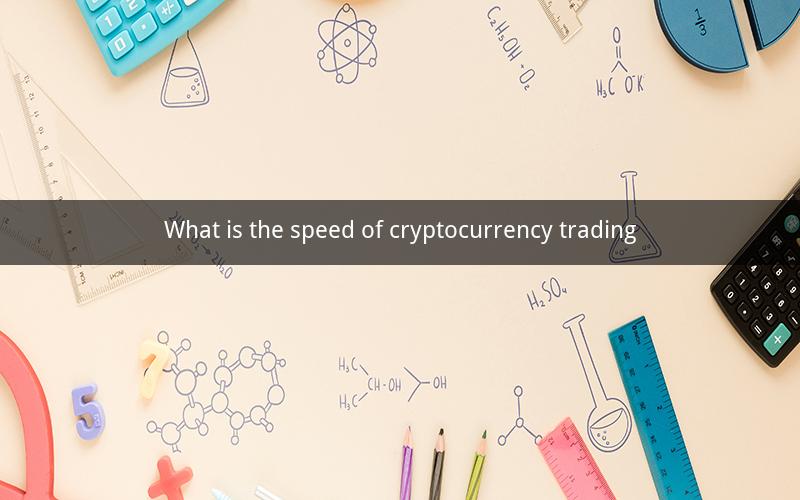
Table of Contents
1. Introduction to Cryptocurrency Trading
2. Understanding Trading Speed
3. Factors Influencing Trading Speed
4. Importance of Speed in Cryptocurrency Trading
5. Common Cryptocurrency Trading Platforms
6. The Role of Technology in Enhancing Trading Speed
7. High-Frequency Trading and Cryptocurrency
8. Risks Associated with Fast Trading
9. How to Improve Trading Speed
10. Conclusion
1. Introduction to Cryptocurrency Trading
Cryptocurrency trading involves buying and selling digital currencies like Bitcoin, Ethereum, and Litecoin. With the rapid growth of the cryptocurrency market, traders are increasingly seeking faster trading speeds to capitalize on market movements.
2. Understanding Trading Speed
Trading speed refers to the time it takes for an order to be executed and the time it takes for the transaction to be confirmed on the blockchain. A faster trading speed can lead to better market execution and potentially higher returns.
3. Factors Influencing Trading Speed
Several factors can affect the speed of cryptocurrency trading:
- Network congestion: High transaction volumes can lead to network congestion, slowing down the confirmation time.
- Blockchain congestion: The blockchain network's capacity to process transactions can be a limiting factor.
- Exchange performance: The speed of an exchange platform can impact the execution of trades.
- Internet connection: A stable and fast internet connection is essential for fast trading.
- Order book depth: The more liquidity available, the faster the execution.
4. Importance of Speed in Cryptocurrency Trading
Speed plays a crucial role in cryptocurrency trading:
- Market execution: A faster trade execution can help traders take advantage of short-term market movements.
- Lower slippage: Slippage refers to the difference between the expected price of a trade and the actual price at which it is executed. Faster execution can reduce slippage.
- Increased liquidity: High trading speeds can attract more liquidity to a market, leading to better pricing.
5. Common Cryptocurrency Trading Platforms
Several trading platforms offer fast trading speeds for cryptocurrency traders:
- Binance
- Coinbase
- Kraken
- Gemini
- Huobi
6. The Role of Technology in Enhancing Trading Speed
Technology plays a vital role in improving trading speeds:
- High-speed internet connections: Using a high-speed, dedicated internet connection can enhance trading speed.
- Advanced algorithms: Some trading platforms utilize sophisticated algorithms to execute trades at lightning speed.
- High-frequency trading (HFT): HFT involves using algorithms to place and execute trades in milliseconds.
7. High-Frequency Trading and Cryptocurrency
High-frequency trading (HFT) has become a significant component of cryptocurrency trading:
- HFT strategies: HFT traders use complex algorithms to analyze market data and execute trades quickly.
- Execution speed: HFT traders aim to execute trades within milliseconds, taking advantage of even the smallest market movements.
8. Risks Associated with Fast Trading
While fast trading can be beneficial, it also comes with risks:
- Execution risk: High-frequency trading can result in unintended trades due to technical issues.
- Market manipulation: Some traders may exploit the speed advantage to manipulate market prices.
- Regulatory risk: Fast trading can attract regulatory scrutiny.
9. How to Improve Trading Speed
Traders can take several steps to improve their trading speed:
- Choose a reputable trading platform with a strong track record.
- Opt for a platform with a dedicated app or desktop software for faster execution.
- Use a stable and fast internet connection.
- Stay informed about market trends and developments.
10. Conclusion
Trading speed is a critical factor in cryptocurrency trading. By understanding the factors that influence trading speed and taking appropriate measures, traders can improve their market execution and potentially achieve better returns.
---
Frequently Asked Questions and Answers
Question 1: How does network congestion affect cryptocurrency trading speed?
Answer: Network congestion can lead to longer confirmation times for blockchain transactions, affecting overall trading speed.
Question 2: What are the advantages of using a high-frequency trading strategy?
Answer: High-frequency trading allows traders to capitalize on small market movements and execute trades at an extremely fast pace.
Question 3: How can a trader reduce slippage in cryptocurrency trading?
Answer: Traders can reduce slippage by placing limit orders, using exchanges with high liquidity, and staying informed about market trends.
Question 4: What are the potential risks of trading cryptocurrencies at high speeds?
Answer: Risks include technical failures, market manipulation, and regulatory scrutiny.
Question 5: Can a slow internet connection affect cryptocurrency trading?
Answer: Yes, a slow internet connection can lead to delays in order execution, impacting overall trading speed.
Question 6: What role does blockchain congestion play in cryptocurrency trading?
Answer: Blockchain congestion can cause longer confirmation times for transactions, potentially slowing down trading.
Question 7: Are there any limitations to high-frequency trading in cryptocurrency?
Answer: Yes, high-frequency trading may face limitations due to regulatory restrictions, technical failures, and market volatility.
Question 8: How can a beginner trader improve their trading speed?
Answer: Beginners can improve their trading speed by choosing a reputable exchange, using a stable internet connection, and staying informed about market trends.
Question 9: What are some common reasons for network congestion in cryptocurrency?
Answer: Network congestion can occur due to high transaction volumes, new updates, or issues with the blockchain network itself.
Question 10: Can using advanced algorithms improve trading speed?
Answer: Yes, advanced algorithms can analyze market data and execute trades quickly, potentially improving overall trading speed.